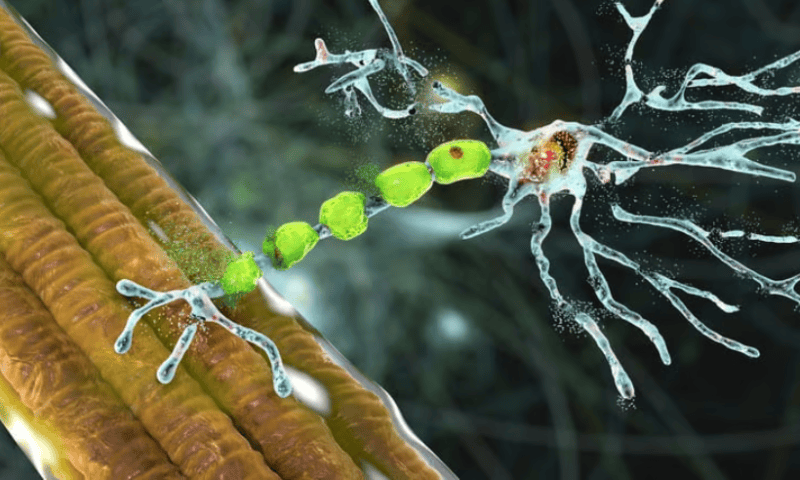Athira Pharma’s amyotrophic lateral sclerosis (ALS) drug ATH-1105 appears to boost survival and reduce motor function decline in mouse models of the disease, according to new data published Feb. 7 in Frontiers in Neuroscience.
“These data demonstrate that ATH-1105 treatment results in significant, consistent beneficial effects both in cell culture and in vivo models of ALS,” Kevin Church, Ph.D., chief scientific officer at Athira, said in a press release. “These studies further support the therapeutic potential and continued development of ATH-1105, which is targeted to advance into first-in-human studies this year.”
The new study reports on experiments conducted on cultured neurons and mouse models. One set of experiments involved 60 male mice, 40 of which were models of ALS—meaning they had a gene mutation that causes the buildup of TDP-43, the most plausible culprit in neuronal damage caused by the disease. The ALS mice were given either ATH-1105 or a control solution beginning from ages 1 to 5 months old.
The time to death was 85 days in the mice that received the control solution and 129 days in the mice treated with ATH-1105. At 152 days, 75% of the treated mice were still alive, compared with 35% of the untreated mice.
Motor function tests showed that ALS mouse models that received the treatment experienced slower motor function decline and better nerve function than the ones that were untreated. The treated animals also lost less weight and had fewer biomarkers associated with neurodegeneration and inflammation.
In addition, the researchers conducted experiments to assess the efficacy of delayed treatment. In this case, the researchers used 40 male mice separated into four groups of 10, including three groups of mice with the same gene mutation that causes TDP-43 buildup and one group of healthy controls. The groups of ALS mouse models were treated with a saline solution, daily doses of ATH-1105 for four months beginning at 1 month old, or daily doses for four months beginning at 2 months old.
While the researchers did not report a survival benefit with delayed treatment, they did show that the mice in the delayed treatment group had a slower decline of motor skills and better nerve function than the untreated animals.
“This suggests that ATH-1105 has preclinical efficacy in slowing ALS-related neuromuscular deterioration, even when treatment initiation is delayed to a more advanced point in disease progression,” the researchers wrote in their paper.
The biotech has already set out plans to test ATH-1105 in humans in the first half of 2024.
ATH-1105 is an oral small molecule that works by raising levels of neurotropic hepatocyte growth factor (HGF) via its receptor MET, the sole receptor for HGF. Downstream, this reduces the buildup of TDP-43.
HGF is found in the nervous system, where it’s involved in brain development starting in the prenatal period and extending into adulthood. The HGF/MET system is considered a druggable target in oncology—where MET mutations have been linked to cancer—as well as in ALS, where animal research has long suggested that activating the system can slow down the disease. Impaired signaling in the HGF/MET system also has been linked to other forms of neurodegenerative disease such as Alzheimer’s disease.
Athira isn’t the only company targeting the HGF/MET signaling pathway for ALS. A South Korean company, Helixmith, is reportedly conducting early-stage clinical trials on a nonviral plasmid DNA product called Engesis, which expresses HGF in nerve cells. The company is also working on other ALS candidates that increase HGF expression through an adeno-associated virus and an antibody that binds to the MET receptor, according to a 2022 press release from the company.
Meanwhile, Athira has a lot to prove with its ALS drug after the underperformance of another HGF/MET agonist in Alzheimer’s, Parkinson’s disease and dementia. The company’s drug fosgonimeton failed to reach its endpoints for efficacy in a phase 2 clinical trial on patients who had either Parkinson’s or Lewy body dementia, which followed another phase 2 failure, this time in Alzheimer’s, of the same drug.
Last month, the company completed enrollment for a phase 3 study on a subgroup of patients from the Alzheimer’s study who reportedly experienced a “cognitive benefit” from the drug, according to Athira.

